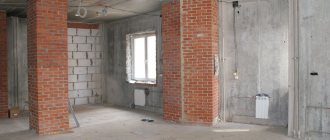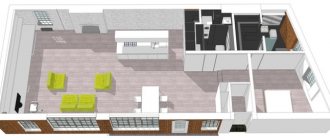Many people, after purchasing a home, plan to remodel it for themselves.
Dear readers! The article talks about typical ways to resolve legal issues, but each case is individual. If you want to find out how to solve your particular problem , contact a consultant:
+7 (499) 938-81-90 (Moscow)
+7 (812) 467-32-77 (Saint Petersburg)
8 (800) 301-79-36 (Regions)
APPLICATIONS AND CALLS ARE ACCEPTED 24/7 and 7 days a week.
It's fast and FREE !
However, not everyone at this moment thinks that before redevelopment is carried out in a municipal apartment, it is necessary to obtain the consent of the competent authorities.
Approval procedure
The stage of agreeing on a project for future changes in a municipal apartment, as well as an apartment owned by right of ownership, is mandatory.
You can arrange for a change in apartment either independently or with the help of organizations that provide intermediary services.
If the owner decides to undertake the approval procedure himself, then the following stages await him:
- drafting. Depending on what kind of redevelopment the owner wants to carry out, he can contact an engineer, or draw up a drawing himself, using the technical plan of the apartment as a basis;
- contacting the BTI to obtain a detailed diagram of the residential premises;
- to the municipal committee, which acts as parties to the rental agreement;
- contacting Rospotrebnadzor, the Ministry of Emergency Situations, as well as other authorities that will verify compliance with fire safety, sanitary standards, as well as other requirements that are established for housing;
- contacting the housing commission, with all approved plans and documents, to make a final decision on the possibility of redevelopment.
The grounds for refusal to issue a permit are:
- failure to provide all required information;
- appeal to a body whose competence does not include resolving this issue;
- the design documentation does not meet the legal requirements for the premises.
What is considered redevelopment
- moving partitions or doorways;
- increasing or decreasing the area and number of rooms;
- arrangement of additional utility rooms, etc.
The redevelopment also includes the installation of additional vestibules in the entrances and staircases. Where to go? In order to receive competent advice regarding which redevelopment does not need to be approved, you should contact the body dealing with these issues. These include:
- Housing Inspection;
- Department or Department of Capital Construction under the local administration.
These same organizations will have to be contacted in the future if it turns out that the planned work requires the issuance of a permit to carry it out.
Features of redevelopment of a municipal apartment
Redevelopment of a municipal apartment has a number of features.
The law does not allow changes to be made without the permission of the body that acted as a party to the social tenancy agreement.
In addition, the main employer must obtain the consent of all family members living with him.
Without their approval, the package of documents will be considered incomplete.
In an apartment building
In order to carry out redevelopment in an apartment building, it is necessary to remember that it must be carried out taking into account all construction requirements.
- The transfer of bathrooms and restrooms by residents of the second floors and above is not allowed.
- Moving the kitchen is prohibited. Installation of a fireplace that is heated with wood only on the upper floors of an apartment building.
In a communal apartment
When living in a communal apartment, you must remember that when carrying out redevelopment you will have to seek the consent of all neighbors.
If the neighbors are not against carrying out such repairs, then their agreement should be drawn up in writing and certified by a notary in the manner established for this.
A written consent form must be obtained from each neighbor.
If the neighbors are against the redevelopment, then, alas, it is impossible to resolve the issue without the intervention of a judicial authority.
You can do without the consent of your neighbors only if they live in adjacent rooms under the terms of a municipal rental agreement.
In this case, the housing committee independently decides on the admissibility of redevelopment.
Where to contact
When thinking about where to start remodeling your apartment, you should make a list of organizations that you will have to visit to obtain permits.
Such services include:
| Organization | What document does it issue? | Additional nuances |
| Rosreestr | An extract from the Unified State Register, which will confirm ownership. | After the redevelopment work has been carried out, you should contact Rosreestr again to make changes to the ownership data, if they are significant. |
| BTI | Technical data sheet, sketch and even redevelopment project. | If the changes are minor, then the BTI will mark them according to the sketch directly in the technical plan. The structures to be removed will be highlighted in red, and the ones you are going to build will be highlighted in green. |
| Rospotrebnadzor and Rospozhnadzor | Permits for reconstruction. | Permits may be required when moving utility lines and household appliances. |
Having collected all these documents and written an application for permission to remodel the apartment, you need to contact the MFC, the housing inspectorate or the locality administration department that oversees housing issues. In Moscow, an application can be submitted to the single window service at the Moscow Housing Inspectorate.
If a person is refused, he can make changes to the project and submit a new application after three months. At the same time, a request to review the previous decision is indicated. If the owner is again denied redevelopment without apparent grounds, he can challenge it in court.
Options
When living in a municipal residential building, you can use the following options for redevelopment of the premises (they are especially often used for Khrushchev):
- combining two residential premises into one;
- dividing one room into two rooms. In this case, it is necessary to pay attention to compliance with sanitary norms and standards for the minimum size of each room, the presence of sunlight in each room. If the initial size of the living room allows you to fulfill the first requirement, then to fulfill the second condition you can use specialized light-transmitting partitions;
- For people planning to carry out redevelopment in a communal apartment, the option of transforming the room into a separate small apartment with a shower and toilet may be of interest. However, for this it is necessary to comply with the requirements that the room is located on the ground floor; ventilation must come from a common toilet room.
Required documents
In order to obtain the consent of the competent authorities, it is necessary to collect the documents provided for by the Housing Code.
These include:
- application form for redevelopment;
- documents indicating that the applicant has ownership rights or other rights to make such an application;
- project of a new residential premises;
- technical passport of the apartment;
- consent of all family members of the tenant of municipal housing (written form required);
- conclusion from the authorized bodies, if the housing is a monument of architecture, history, culture.
What does the term cover?
When considering the question of what refers to the term redevelopment and what does not, it is necessary to be guided by all current regulatory legal acts of the Russian Federation, and first of all, the Housing Code.
Any change in the configuration of a residential property that leads to a discrepancy between the technical passport and the actual location of residential premises falls under the term redevelopment.
Redevelopment includes the following types of work:
- dismantling partitions between rooms;
- moving the doorway;
- increasing the kitchen area at the expense of non-residential space;
- other types of redevelopment.
Project
The main document on the basis of which the authority makes a decision is the redevelopment project.
Its preparation is required to comply with the rules and GOSTs for construction, if the load-bearing structures of the residential premises are affected.
Contents of the document
The redevelopment plan must include the following information:
- general information about the object (location, area, number of rooms);
- explanatory note. It should indicate the placement of wall partitions and other structures before and after redevelopment;
- situation drawing;
- drawing of the location of structures after redevelopment;
- floor plan, as well as sound insulation, waterproofing;
- sewerage and water supply diagram;
- location of pipes in the apartment;
- work to strengthen openings so that the living space can withstand the new load;
- certificate of the organization’s ability to carry out activities to plan changes in an apartment or other residential premises.
How to coordinate
The design documentation is approved by the Housing Commission.
- The documents submitted with the project must be registered by an employee of the authority.
- After registration, the employee is required to issue a certificate of acceptance of all documents, which must indicate the date, position of the employee, as well as his signature.
Review of documents and a decision on them is carried out within no more than 45 days from the date of acceptance of the application.
After the decision is made, it is sent to the applicant by mail, or the applicant picks up the commission’s decision independently.
After receiving the decision, you can begin to change the layout of the apartment.
What is not redevelopment
The following types of work are not redevelopment and do not require approval:
- preparing and covering walls with different types of wallpaper;
- painting or covering (linoleum, parquet, laminate, etc.) of floors;
- moving the heating radiator within the room;
- moving a water heater or washing machine;
- installation of indoor air conditioning;
- work on installing a suspended ceiling;
- changing plumbing pipes;
- installation of new doors in place of old ones;
- replacement of a bathtub, toilet, etc.
Briefly speaking, all work that does not require adjustments to the technical passport of a residential property can be excluded from the concept of redevelopment.
Responsibility for unauthorized actions
In the event that the tenant does not consider it necessary to go through the procedure of agreeing on a decision with the authorized bodies to change the residential premises, he must be prepared to apply the prescribed liability measures against him:
- imposition of administrative liability by the Housing Committee;
- the need to take measures to return the residential premises to their previous condition;
- termination of a social tenancy agreement, eviction of the tenant, as well as his family members, return of the premises to the owner.
How is redevelopment approved after renovation? What are the dangers of unauthorized redevelopment of non-residential premises in an apartment building?
What is considered redevelopment
Owners of residential premises and responsible tenants have the opportunity to use real estate within the limits limited by law. In particular, certain restrictions have been established regarding redevelopment. Dear readers! The article talks about typical ways to resolve legal issues, but each case is individual.
If you want to find out how to solve your particular problem , contact a consultant: This change is considered a redevelopment and is subject to approval, since the location of the toilet is included in the BTI plan, in addition, such actions may affect engineering devices. If balcony glazing was initially included in the house design, then the absence of this design element is considered a serious change in the architectural appearance of the building and is subject to redevelopment. For this reason, approval is required when demolishing this structure. When selling, registering a mortgage or pledge, you will have to dismantle the structure or the transaction will be refused.
Fines
- For carrying out redevelopment that is not legalized in the prescribed manner, an administrative fine is imposed, the amount of which ranges from 2,000 to 3,000 rubles .
- In the case where the use of the apartment is carried out by a legal entity, the fine in this case reaches 300,000 rubles .
Photo: fines for unauthorized actions
Questions and answers
Where to legalize after repair
So, how to legitimize changes if they were carried out in an illegal way?
To do this you can contact:
- to the court with a corresponding application;
- to the Housing Commission in the manner prescribed for the approval of the redevelopment project.
Is residents' consent required?
In accordance with the norm of the Housing Code of the Russian Federation, in the case of redevelopment in communal apartments, it is necessary to obtain the consent of all residents living together with the tenant.
Without the consent of the registered tenant, the committee will not allow redevelopment, even if he does not live with the tenant, but is a member of his family and is registered with him.
The consent obtained must be in writing and certified by a notary.
The consent is attached to the remaining information submitted to the Housing Commission.
How to resolve the issue through court
The apartment can be preserved in a new form through the court, based on its decision, if this does not contradict the interests of citizens and does not create consequences for their life and health.
An appeal to the court is allowed in connection with the refusal of the competent authority to legalize the redevelopment.
The following information is submitted to the judicial authority:
- statement;
- applicant's passport;
- documents submitted to the Housing Commission;
- appealed decision of the commission.
How to file a claim
The application must include the following information:
- name of the judicial authority;
- applicant details;
- name of the defendant (housing service);
- data on the period of concluding a social tenancy agreement;
- location of living space;
- on sending to the Housing Commission the data necessary to legalize the change;
- the basis for refusal to redevelop;
- disagreement with the decision made, the legal basis for this disagreement.
Here you can find a sample statement of claim.
When will the decision be made
Depending on the information submitted to the court, the period for consideration of the claim may vary.
- If the documents are presented in full, and the court does not require additional examinations to make a decision, then the court decision is made within one or two court hearings.
- If all the information was presented, and an examination was also required, then the trial period will drag on until the full information or expert opinion is presented.
What is forbidden to do in apartment buildings
The law does not allow:
- combining loggias and balconies with living quarters by dismantling the outer wall;
- transferring heating structures to a balcony or loggia;
- combining apartments vertically, accompanied by the dismantling of interfloor structures;
- increasing the area of the bathroom or toilet by reducing the area of the living space;
- reorganize the living space in a way that increases the load on the interfloor floors.
What is considered a refurbishment?
Refurbishment of premises includes:
- transfer, dismantling and construction of new interior partitions, doorways;
- disaggregation of multi-room apartments;
- punching openings in load-bearing structures and their partial demolition;
- increasing the size of the kitchen, bathrooms, corridor and rooms;
- changing the location of the kitchen or bathroom;
- combining bathroom and toilet;
- installation of additional kitchens and bathrooms;
- expansion of living space due to auxiliary premises;
- combining two or more apartments;
- installation of household electric stoves instead of gas ones;
- relocation of electrical networks, heating plumbing and gas appliances;
- installation of additional ventilation ducts.
Unacceptable actions during reconstruction
Making changes to the design of a residential premises is not allowed if:
- consent was not obtained from all family members of the tenant or adult residents;
- the change contradicts and violates sanitary standards and fire safety;
- changes lead to a violation of the strength of house structures;
- changes violate the safety and appearance of the facade, the operation of fire protection structures, the operating conditions of the house, and the living conditions of the remaining residents of the house;
- Changes to the architectural appearance of the house are not allowed.
What is a violation of building codes
Violations of construction standards are:
- installation of doors and windows in the load-bearing structures of the room;
- work leading to poor ventilation;
- changing the hydraulic system of the house;
- construction of an entrance to the premises from the street or landing;
- changes that prevent neighbors from accessing residential premises.
What could be the consequences of illegal repairs?
In the event that a person has converted a residential premises without the permission of the competent authority, he must be prepared for the following consequences:
- imposition of an administrative fine;
- obligations to cancel all redevelopments;
- termination of a social tenancy agreement.
When there is no need to legitimize
Housing legislation allows the following changes to be made without permission:
- reinstallation of heating structures;
- transfer and installation of partitions;
- installation of openings for doors, as well as their dismantling;
- changing the direction of door opening, the size of the window opening;
- installation of new window blocks.
How to coordinate if there is no information in the BTI plan
If the BTI does not contain information about the technical plan, then it is necessary:
- write an application for its issuance;
- provide information:
- identification document;
- certificate of ownership;
- duty payment receipt;
- in two weeks he will appear for a technical passport.
Does redevelopment of apartments require approval? What is included in the redevelopment of an apartment? Find out here.
How to legalize redevelopment in a dorm room? Read on.
General information and summary of the law
The Housing Code of the Russian Federation is considered the main legal act, which talks about how, according to the law, it is correct to carry out the refurbishment and redevelopment of your own apartment.
The procedure for carrying out such work is prescribed in Chapter. 4, art. - Residential Complex of the Russian Federation. According to the new law of the Russian Federation dated December 27, 2021 No. 558-FZ on the reconstruction and redevelopment of apartments and various non-residential premises, some changes have been made to Chapter 4 of the Housing Code of the Russian Federation. The list of specific repair works is listed in Decree of the State Construction Committee of the Russian Federation No. 170 dated September 27, 2003 and Decree of the Moscow Government No. 508 dated October 25, 2011.
Article 25 of the Housing Code of the Russian Federation “Types of reconstruction and redevelopment of premises in an apartment building”
Article 26 of the Housing Code of the Russian Federation “Grounds for reconstruction and (or) redevelopment of premises in an apartment building”
Article 27 of the Housing Code of the Russian Federation “Refusal to approve the reconstruction and (or) redevelopment of premises in an apartment building”
Article 28 of the Housing Code of the Russian Federation “Completion of reconstruction and (or) redevelopment of premises in an apartment building”
Article 29 of the Housing Code of the Russian Federation “Consequences of unauthorized reconstruction and (or) unauthorized redevelopment of premises in an apartment building”
Federal Law of December 27, 2018 No. 558-FZ “On amendments to the Housing Code of the Russian Federation in terms of streamlining the rules governing the reconstruction and (or) redevelopment of premises in an apartment building”
Resolution of the State Construction Committee of the Russian Federation dated September 27, 2003 No. 170 “On approval of the Rules and Standards for the technical operation of the housing stock”
Decree of the Moscow Government of October 25, 2011 No. 508-PP “On the organization of reconstruction and (or) redevelopment of residential and non-residential premises in apartment buildings and residential buildings”
Innovations
The main innovations that relate to major repairs in residential premises are reflected in the Federal Law on Re-equipment and Redevelopment No. 558 of December 27, 2021. As of 2021, the following changes have entered into legal force:
- Now, before apartment redevelopment, the department of urban planning architecture (in the local administration) does not take a certificate confirming that the apartment belongs to the number of architecturally significant structures and buildings;
- if a specific property is already in the Unified State Register, then the title documentation (Extract from the Unified State Register) is also not provided to the SES, housing inspectorate and other supervisory authorities.
Important! Coordination of apartment redevelopment is carried out in a specific government agency.
For Moscow, this is considered the Moscow Housing Inspectorate and its branches in various administrative districts.
According to clause 9 of the Law of the Russian Federation of December 27, 2021 No. 558-FZ on the redevelopment of apartments and various non-residential premises, in clause 3 of Ch. 4 of the RF Housing Code specific amendments have been made. Such changes concern the reconstruction of real estate objects that are classified as the common property of a new or old apartment building.
Main change: start of work only after approval
In 2021, approval for reconstruction (re-equipment) or redevelopment of an apartment or other living space is carried out before the start of major repairs. In this situation, along with the application to the BTI, they provide the following documentation:
- Personal passport;
- A photocopy of the sketch or project;
- Official permission from the Housing Inspectorate;
- Technical official report on the condition of load-bearing structures. Such a document is obtained from a specific design organization that has SRO approval;
- New cadastral passport.
Read also: Commodity examination
According to clause 5 of Federal Law No. 558 of December 27, 2021 on reconstruction (re-equipment) and redevelopment, in clause 2 of part 5 of art. 20 of the RF Housing Code some changes have been made. In 2021, officials from the housing inspectorate, SES and other similar offices conduct an inspection of a certain apartment only with the consent of more than 50% of the owners or tenants of housing under a social tenancy agreement .
The need for approval
According to Art.
Housing complex of the Russian Federation, according to the law, redevelopment is a significant change in the structure of an apartment or other similar housing, which is recorded in the cadastral passport. If, after carrying out such a major overhaul, the shape, strength and other characteristics of the walls, floors, and ceilings do not change, then they will immediately begin arranging the apartment. In extreme cases, they are not approved by Rospotrebnadzor, SES, Pozhnadzor and other similar authorities. This is possible in the following situations:
- when installing a partition made of plasterboard, insulation in the form of polystyrene foam and other non-permanent materials in the room;
- when replacing an old electric or gas stove with a new one;
- when installing a satellite dish, split system or television antenna;
- during the construction or dismantling of an apartment vestibule.
According to clause 13 of the Law of the Russian Federation of December 27, 2021 No. 558-FZ on reconstruction (re-equipment) and redevelopment, in clause 3.1 of Art. 44 of the RF Housing Code some amendments have been made. Now, at the general meeting of apartment owners, a list of persons is determined who, on behalf of the owners of residential premises, provide the necessary documentation for the approval of major repairs on a certain living space.
Previous restrictions
The new Law of the Russian Federation dated December 27, 2021 No. 558-FZ on the redevelopment and reconstruction of apartments does not establish any new restrictions on such work - the previous prohibitions remain in force.
According to Moscow government decree No. 508 of October 20, 2011, the following actions are unacceptable when carrying out such major repairs:
- dismantling of common pipeline systems and sewerage that are laid through the entire multi-storey residential building;
- destruction of the load-bearing walls of the building;
- expansion of living space to the detriment of its neighbors on all floors;
- combining a kitchen (with gas stoves) with a hall, corridor or other similar room;
- combining a loggia or standard balcony with any room.
Important! Consent for apartment redevelopment is signed by all adult apartment owners. If at least one of the owners objects, then such major repairs will be declared illegal.
Departure of a special commission from the housing inspection
If the approval of apartment redevelopment is carried out not according to an approved specific project, but according to a sketch, then a special commission is created in the housing inspection and sent to the place where such repair work is carried out.
Previously, a sketch of future apartment changes was drawn by hand on a technical plan. Now employees of the Housing Inspectorate must come to a specific site, regardless of the scale of the repair work being carried out.
New buildings: carrying out major repairs before official registration of ownership rights
Some important changes have also been introduced into the procedure for apartment redevelopment and refurbishment in a modern new house - in a new building. Now such repair work is approved before the official registration of ownership of a specific apartment. In this situation, the BTI provides the following documentation:
- An agreement for participation in shared construction or another similar document that confirms the assignment of rights to housing;
- The act of transferring a specific apartment;
- A photocopy of the permit to put a new multi-storey residential building into operation;
- Official consent of a specific developer (stamped document) to carry out major repairs in the apartment;
- A confirming official document from the official developer confirming that the applicant has fulfilled all obligations assigned to him under the concluded agreement for participation in shared construction;
- Certificate of assignment of a specific address to a multi-storey residential building;
- Evidence that the official address is the same as the postal address.
Attention! After registering the ownership of a specific apartment with the local MFC or Rosreestr, approval of apartment redevelopment in a new building is carried out according to the same rules as in various old buildings.
No longer valid
Previously (until 2021), certain types of apartment redevelopment required mandatory permission. The following repair work is no longer approved:
- replacement of outdated plumbing fixtures in the bathroom, bathroom and kitchen;
- installation of a water heater and geyser;
- changing various gas equipment and room batteries without changing their location, etc.
Read also: Rights of pregnant women at work under the Labor Code
Below are the main features of such a major overhaul.
Peculiarities
The cost of apartment redevelopment is directly related to the following factors:
- Receiving paid legal assistance from a lawyer;
- The size of the living space;
- The scope of future repair work;
- Deadline for obtaining official permission;
- The region in which the owner of the property is registered.
In Moscow, apartment redevelopment is carried out for 20,000-150,000 rubles, and in the regions - for 3,000-80,000 rubles.
How much do specialist services cost?
The cost of services of specialists involved in the development of a redevelopment plan, or participating in the procedure for approving a solution, depends on the region in which the residential premises are located.
So, for example, in Moscow, the following approximate prices are established in case of contacting specialists:
| Type of services provided | Cost, rub.) |
| Coordination of the redevelopment procedure without changing the load-bearing structures | 40 000 |
| Coordination of the redevelopment procedure with changes in load-bearing structures | 60 000 |
| Preparation of technical documentation | 12 000 |
| Drawing up a conclusion on the possibility of redevelopment | 15 000 |
| Consulting on redevelopment issues | 3 000 |
| Contacting the BTI | 3 000 |
To summarize all of the above, it should be noted that approval of any changes in residential premises is a mandatory requirement of the law.
Do I need permission to install a plasterboard partition in a room?
An approximate algorithm of actions related to redevelopment will be as follows:
- Determine whether the planned work requires approval.
- Obtain a technical passport from the BTI (if this has not been done before).
- Mark the upcoming changes on the plan attached to the technical passport.
- Draw up a redevelopment project.
- Please contact the Housing Inspectorate with your plan, project and application.
- Carry out repairs.
- Draw up an act on the redevelopment carried out and submit it to the BTI.
- Call a technician from this organization to draw up a new apartment plan.
- Receive a technical passport with changes from the BTI.
What redevelopment does not need approval? The easiest way to perform those types of work that do not require approval from regulatory authorities.
Owners of residential premises and responsible tenants have the opportunity to use real estate within the limits limited by law. In particular, certain restrictions are established regarding redevelopment. What is meant by them, what changes to the premises fall under this definition, what regulations regulate their implementation and legalization, is detailed in this article.
What is it? Redevelopment means changing the structural elements of a room. The concept of the term is given in Article 25 of the Housing Code of the Russian Federation, and its difference from reconstruction, including the transfer or replacement of sanitary equipment and utility networks, is indicated, which entails making adjustments to the technical documentation for the premises. The Housing Code provides for the provision that redevelopment entails changes to the technical documentation for the apartment.










